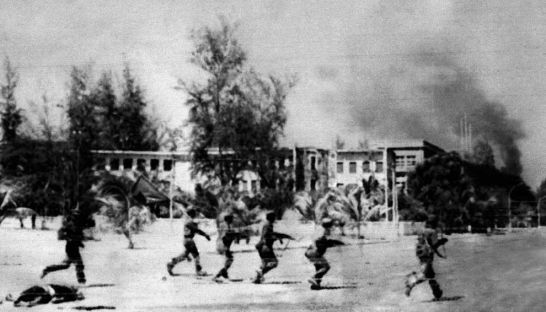Cambodia – Always Remember January 7
HISTORY, 12 Jan 2015
Kok-Thay Eng – The Phnom Penh Post
Today, January 7, marks the day in 1979 when Cambodians were liberated from genocide. As the years passed, however, some people began to see January 7 as the start of an invasion of the Kingdom by Vietnam, and thus there is little to commemorate. But I personally believe that liberating a population from genocide is more important than the temporary loss of sovereignty of the Cambodian state.

Kampuchean People’s Revolutionary Armed Forces and Vietnamese soldiers move into Phnom Penh to liberate the capital on January 7, 1979. AFP
However, I recognise that there has been an international debate about the appropriateness of bringing down a genocidal regime by use of a foreign occupation. Liberating a people from a brutal government by military means have taken place a few times since the Genocide Convention in 1948.
It is a major responsibility of the global community to free victims from the jaws of death by mass killing. The “responsibility to protect” theory raises the importance of liberation from genocide above nation-state principles.
Therefore January 7, 1979, should be a day when ASEAN nations, at the very least, contribute to the raising of awareness about genocide in Cambodia within their states, with a goal of adopting a regionally integrated genocide education system.
ASEAN integration would not be possible without collective social and historical consciousness. Genocide in Cambodia must be learned across ASEAN because it was a crime against humanity committed against the Cambodia people in a manner that affects all of mankind.
In my opinion, beyond prosperity and security, ASEAN has an obligation to promote human rights and moral education; raise awareness of the mass atrocities that have happened in the region; educate younger generations across ASEAN on the genocide that befell Cambodia; and create a model for protection of people in the member states in the future.
This program should be included in a new ASEAN work plan on education as an additional objective that recognises the plight that Cambodian people faced from 1975 to 1979 and the sufferings brought to the people in East Timor between 1975 and 1999.
Since ASEAN was created in 1967, the region experienced civil wars and genocide resulting in millions of deaths. The most notable war was in Indochina. The genocide that resulted was the work of the Khmer Rouge, an extreme Maoist entity that commited atrocities against their own people.
This case of genocide is completely different from the Holocaust, whose victims and perpetrators were clearly defined and took place within a global conflict. In Cambodia the genocide happened within a regional conflict in an atmosphere of non-interference, meaning that ASEAN member states had full knowledge of what was occurring in Cambodia but chose a misguided path of nonintervention.
Of course, at that time, Cambodia was not a member of the association, but this is an interesting lesson that ASEAN should learn by educating younger generations and posing questions about the moral responsibility of stopping a genocide happening in the region.
Security and economic cooperation in ASEAN will become meaningless if atrocities happen in a member state while other members acting as unconcerned bystanders.
__________________________
Kok-Thay Eng is the deputy director of the Documentation Center of Cambodia.
Go to Original – phnompenhpost.com
DISCLAIMER: The statements, views and opinions expressed in pieces republished here are solely those of the authors and do not necessarily represent those of TMS. In accordance with title 17 U.S.C. section 107, this material is distributed without profit to those who have expressed a prior interest in receiving the included information for research and educational purposes. TMS has no affiliation whatsoever with the originator of this article nor is TMS endorsed or sponsored by the originator. “GO TO ORIGINAL” links are provided as a convenience to our readers and allow for verification of authenticity. However, as originating pages are often updated by their originating host sites, the versions posted may not match the versions our readers view when clicking the “GO TO ORIGINAL” links. This site contains copyrighted material the use of which has not always been specifically authorized by the copyright owner. We are making such material available in our efforts to advance understanding of environmental, political, human rights, economic, democracy, scientific, and social justice issues, etc. We believe this constitutes a ‘fair use’ of any such copyrighted material as provided for in section 107 of the US Copyright Law. In accordance with Title 17 U.S.C. Section 107, the material on this site is distributed without profit to those who have expressed a prior interest in receiving the included information for research and educational purposes. For more information go to: http://www.law.cornell.edu/uscode/17/107.shtml. If you wish to use copyrighted material from this site for purposes of your own that go beyond ‘fair use’, you must obtain permission from the copyright owner.